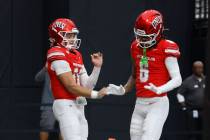Bookmaker Asher re-enters sports-betting market with Boomer’s
Joe Asher has been around gambling, casinos and horse racing all his life, so it shouldn’t come as a surprise that his new sportsbook, Boomer’s, is named for a horse.
Actually, it’s named for a family dog who took its name from a Canadian racehorse, Boomer Drummond.
Asher figures it fits right in with sports, as a nickname for former MVP quarterback Boomer Esiason, legendary ESPN broadcaster Chris Berman, who goes by “Boomer,” and the University of Oklahoma’s famed Boomer Sooner rallying cry.
Boomer was a rescued Dachshund-cocker spaniel mix who lived to be 17 and died last Thanksgiving. He would hang out with the other Asher family dog with a gambling-related name, Lucky.
Fast forward to summer 2025 and Boomer is immortalized as the name of Nevada’s only independent sportsbook with a home base in Elko and satellite locations at Ellis Island Casino in Las Vegas, Casino Valle Verde in Henderson and Casino Fandango in Carson City.
If Asher has his way, Boomer’s will expand to a couple dozen satellite locations only in Nevada.
With the National Football League season opening this month, Asher elaborated on his career as a bookmaker in an exclusive interview with the Review-Journal. It’s been edited for brevity and clarity.
REVIEW-JOURNAL: The sportsbook market seems to be pretty saturated. What made you decide to bring Boomer’s to life?
ASHER: It had been something I’ve been thinking about since I left William Hill when Caesars bought it in 2021. Every few months somebody would call me and say something like, “Hey, ever think about getting back into the business?” Or “It’s not the same since you left. What are my options for a sportsbook?” Probably in early ’24, I started thinking more seriously about it.
RJ: How did you first become interested in sports betting?
ASHER: My dad was a gambler, so I grew up in Wilmington, and my dad gambled on everything. And so from my very earliest memories, I remember going to Brandywine Racetrack, where the Brandywine name came from, and Delaware Park, the other racetracks in Delaware. I was actually at Delaware Park with my dad the day Spectacular Bid ran in 1979, his first race after losing to Belmont, which would have won him the Triple Crown. His first race back was at Delaware Park, and the legendary jockey, Bill Shoemaker, flew in from California to ride him. And I started working at the racetracks when I was 16. But my dad had bet on sports with his bookie, and I was a little statistics geek, and would clip out the box scores. tell him who I thought he should bet on. But gambling was just such a big part of my life at that early age. I was shooting dice in the back of a butcher shop when I was about 9 years old. I learned to count cards in blackjack when I was 12. I went to an Atlantic City casino when I was 14 and got this job at Brandywine when I was 16 and started announcing horse races. At one point I was the youngest race track announcer in the country, at Dover Downs in Harrington. Worked at a racetrack in Massachusetts called Foxboro, which was adjacent to where the Patriots played back in those days. So I was just always around gambling and always had this fascination with the business and with sports betting. So fast forward to 2006, I move out to Las Vegas, thought there might be an opportunity for a sports book. company to enter the market.
RJ: Sports betting is legal in 38 states and Washington D.C. Is there still room for expansion?
ASHER: There are the states that haven’t yet legalized it, which are obviously, by definition, difficult because they haven’t gotten it over the line in the seven years since the Supreme Court overruled PASPA. Obviously, California is Exhibit A for that. Eventually, I think sports betting is legal in all 50 states. I still stick to that, but I’ve never put a date on it, so you can’t say I was wrong. But without legal and regulated sports betting, you just leave people doing what my dad was doing, which was betting illegally with a bookie. Now some are betting offshore. And now we have these sports betting products that are unregulated in states that haven’t legalized sports betting. But people are gambling on sports on these products of varying degrees of omission. regulation, or lack thereof, with respect to a number of these, which doesn’t seem like the right approach to me. I’ve long been of the view that sports betting should be legal and regulated, and those things should be done at the state level.
RJ: You’ve indicated Boomer’s is strictly a Nevada operation. Could that change if the conditions are right?
ASHER: We’ve been offered opportunities in a number of other states, Mississippi, Pennsylvania, Iowa, Missouri, and I’ve turned them all down.
RJ: Could that change?
ASHER: No. I have no desire to change. In Nevada, sports betting is driven by in-person sign-up requirements. In order to open a mobile sports betting account, you must physically go into a casino to do it. In other states, you don’t have to do that. You can just download the app, sit on your couch, fund it remotely, and away you go. Nevada requires in-person sign-up, and that fundamentally shapes the industry in Nevada. And that flows from this long -standing public policy in Nevada of encouraging investment in brick-and-mortar casinos. It’s been a longstanding policy which has led to substantial capital investments in reliance of that regulation.
RJ: You’ve incentivized sign-ups to grow the business with matching deposits and better odds on National Football League games. Can you explain for those who don’t really bet on sports or understand what that means?
ASHER: We recognize that Nevada is a mature market for sports betting and people who want a mobile betting account already have at least one. So since we’re new to the market, we’ve got to give people a reason to sign up. The first two things we’ve done are the $250 deposit match. So if you deposit any amount of money up to $250, we will match it in bonus bets. So if you deposit $250, you get $250 in bonus bets. And then you can use that bonus bet amount when you bet cash. You’re getting an extra $250 worth of bets in addition to the $250 that you’ve deposited. And you can also do it for smaller amounts. Some people will deposit $100 or less and you get $100 bonus bets. For -105, the NFL regular season games, typically when you’re making a bet, a straight bet or a point spread bet as people call it, the Eagles were an eight-point favorite over the Cowboys. Typically the bettor would put up $110 to win $100. And if you win, you get $210 back. And if you lose, you’ve lost $110. We’ve decided that for every NFL regular season game, we’re going to offer -105. So instead of putting up $110 to win $100, you put up $105 to win $100. So that if you lose, you’ve only lost $105 rather than $110. Or if you bet $500, say, instead of putting up $550 to win $500, you’re putting up $525. So, in effect, we’re cutting the price in half.
RJ: Can you say how many sign-ups Boomer’s now has?
ASHER: It’s been a great response. I don’t want to give you a particular number for competitive reasons, but the response has been pretty good, and obviously last week in particular was a big week, and we’re trying to get as many people signed up as we can. The sign-up process is actually quite easy. You can do it in advance and most of it on your phone. You scan your driver’s license with the camera on your phone, and then that final step, when you go into the sportsbook to sign up, be it Ellis Island or Casino Valle Verde or the old Commercial in Elko or Fandango in Carson City, the average sign-up time is about two to three minutes.
RJ: You’ve been a critic of national prediction markets like Kalshi and Robinhood. Why is their presence a threat to sports betting?
ASHER: I think this whole idea of a Commodity Futures Trading Commission-authorized exchange being able to offer sports betting but calling it a prediction market is absurd. The CFTC regulates corn, wheat and pork bellies, right? It was never intended to regulate sports betting. Sports betting has historically been regulated at the state level. There was this whole big court fight over the legality of the Professional and Amateur Sports Protection Act that essentially limited sports betting to Nevada and to a smaller extent in Delaware and a couple of other states. We’re now supposed to believe that that whole litigation was meaningless because it was legal all along under the Commodities Exchange Act? I think that’s just ridiculous.
RJ: How do you think it’s going to play out?
ASHER: Time will tell. It’s hard to see anything happening at the CFTC level for the next 3½ years. And the court process takes a long time. I think eventually courts will rule that this is illegal and outside the purview of the Commodities Exchange Act, because I think it so obviously is. So I think eventually the courts find that this is illegal, but that could take years to play out. But I think the status quo is just absurd and unsustainable.
Contact Richard N. Velotta at rvelotta@reviewjournal.com or 702-477-3893. Follow @RickVelotta on X.























